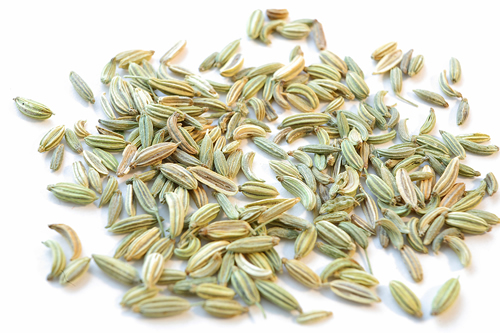Description
Botanical: Foeniculum vulgare
Other common names: Fennel Fruit, Large Fennel, Sweet Fennel, Wild Fennel, Fenchel
When you need relief from indigestion, acid indigestion, intestinal gas and upset stomach, open your herbal or kitchen cabinet, and reach for the Fennel. It is also an old-fashioned cough remedy that will loosen phlegm and ease coughs and colds. For two thousand years, many people have relied on it for its weight control benefits.
Country of Origin: India
Beneficial Uses:
Since ancient times, Fennel has been primarily used to stimulate good digestion. Anethole and other terpenoids inhibit spasms in smooth muscles, such as those in the intestinal tract, and this is thought to contribute to Fennel's use as a carminative. Because it relaxes the smooth muscle lining of the digestive tract, it has helped alleviate acid-stomach, flatulence, food poisoning, motion sickness, feelings of fullness and gas, nausea and vomiting. Fennel is an aromatic stimulant that is good for the gastrointestinal tract and relieves abdominal pain, colon disorders, gastrointestinal tract spasms and also helps to expel gas and ease infant colic.
Although it is sometimes thought to perk up poor appetite, Fennel has a very old application as an appetite suppressant, as it allays hunger for a while, and may help in weight loss programs.
Fennel is considered a very effective expectorant that has been known to expel mucus accumulations. It is a fine remedy for respiratory ailments, including asthma and bronchitis. The herb contains creosol and alpha-pinene, two agents that help to loosen phlegm and bronchial secretions and thereby ease non-productive coughs and relieve colds. Because it promotes expectoration, Fennel is included in cough syrups and lozenges, both as a pleasant flavoring, in addition to clearing the lungs.
As an antifungal, Fennel is said to inhibit yeast growth and is effective against Candida albicans.
Fennel appears to increase the efficacy of the antibiotic, streptomycin, when used against tuberculosis, although it shows no effect on the disease-causing bacteria themselves. Fennel does, however, possess some antibacterial qualities and is used externally by traditional herbalists to reduce inflammation of the eyes (as an eyewash) and skin, especially in cases of infection.
As a diuretic, Fennel promotes urine flow. It is also thought to increase perspiration and reduce intermittent fevers. In addition, Fennel is believed to promote the functioning of the kidneys, liver and spleen, and may even reduce toxic effects of alcohol on the body.
Fennel is believed to possess mild hormonal effects that increase concentrations of estrogen in the bloodstream. European herbalists have prescribed it for centuries to promote menstruation and to enhance breast milk in nursing mothers.
Some early lab experiments have indicated that use of Fennel causes a reduction in arterial blood pressure, and heart and respiratory rates were not affected.
When used externally and rubbed on affected parts of the body as a topical anti-inflammatory, Fennel's properties are another age-old remedy for alleviating stiff, painful joints, arthritis and rheumatism. It is also thought to hasten the healing of muscle strain and hernia.
Contraindications:
Since Fennel Seed Herbal Supplement is thought to increase concentrations of estrogen in the bloodstream, it should be avoided by pregnant women and by women who have any kind of estrogen-sensitive disorder, such as breast or uterine cancer, fibrocystic breasts, fibroids or ovarian cysts.
Fennel should not be taken in excessive (many times the recommended dosage) amounts, and diabetics should use it in moderation, because of its natural sugar content. It is not recommended for people with liver damage. Fennel does not allow the body to absorb the antibiotic, Cipro, and both should not be taken at the same time as antibiotics. Anyone allergic to celery, carrots, dill or anise should avoid Fennel, and the herb may produce photosensitivity in sunlight.


